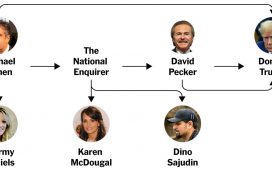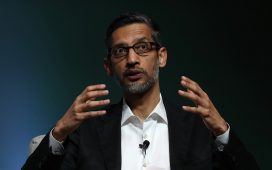PROGRAMMING NOTE: Morning Money will not publish on Monday May 27. Our next Morning Money newsletter will publish on Tuesday May 28. Please continue to follow PRO Financial Services issues here.
Editor’s Note: This edition of Morning Money is published weekdays at 8 a.m. POLITICO Pro Financial Services subscribers hold exclusive early access to the newsletter each morning at 5:15 a.m. To learn more about POLITICO Pro’s comprehensive policy intelligence coverage, policy tools and services, click here.
Story Continued Below
Infrastructure week lasted under ten minutes — We were pretty bearish on the idea of an infrastructure deal on Wednesday. Turns out maybe we were too hopeful. Because President Trump stormed out of his meeting with Democrats before it even began and then held a press conference in which he basically said: “Stop investigating me or we won’t do anything at all.”
That doesn’t bode especially well for fiscal talks, which seemed so hopeful on Tuesday. The political calculus still favors a deal to raise the debt limit and remove sequester cuts. But as we’ve seen so many times before, all Trump has to do is get mad or watch some Fox news to blow everything up. So nothing is certain. A deal to provide disaster funding is now also very much in doubt.
Debt limit X date — Treasury Secretary Steven Mnuchin said Wednesday that the U.S. would run out of borrowing room by late summer. For some, that means the real X date is some time in the fall.
J.W. Verret, law professor and former senior GOP hill aide emails: “The Treasury Department’s late summer deadline for the debt is a negotiating tactic, like always. Treasury always leaves a quarter year or so of wiggle room. CBO’s estimate is always the real estimate.”
GOOD THURSDAY MORNING — Email me on bwhite@politico.com and follow me on Twitter @morningmoneyben. Email Aubree Eliza Weaver on aweaver@politico.com and follow her on Twitter @AubreeEWeaver.
President Trump gives remarks on “supporting America’s farmers and ranchers” at 3:15 p.m. … Initial jobless claims at 8:30 a.m. expected to rise to 215K from 212K … New Home Sales at 10:00 a.m. expected to hit 675K …
MAY ON THE ROPES — Our Charlie Cooper: “Theresa May’s government lost a senior minister Wednesday, hours before the U.K. votes in the European election and amid growing pressure for the prime minister to set her resignation date.
“Andrea Leadsom quit as leader of the House of Commons, saying that she could not support May’s plan to give MPs a vote on whether to hold a second Brexit referendum. Her resignation came as the crescendo of a major backlash from her party against May’s so-called ‘new Brexit deal,’ which contains a string of concessions to opposition MPs. …
“May will come under intense pressure to offer her resignation on Friday if early indicators show the Conservative party performing poorly in the European election, MPs and officials said” Read more.
TUBMAN $20 ON HOLD — Our Victoria Guida: “Treasury Secretary Steven Mnuchin on Wednesday said a redesign of the $20 bill, expected to feature famed abolitionist Harriet Tubman, is unlikely to come out before 2028, drawing a sharp response from a lawmaker who pressed him on the issue.
“Rep. Ayanna Pressley (D-Mass.) repeatedly questioned Mnuchin on his timetable for redesigning the bill, asking if it was still on track for 2020, as Mnuchin’s predecessor had once said. Sort of, Mnuchin said. … During the 2016 presidential campaign … Trump said putting Tubman, a former slave, on the $20 bill, would be ‘pure political correctness’ — and suggested instead that her likeness could go on the $2 bill. The $20 bill currently features the image of Andrew Jackson, one of Trump’s favorite presidents” Read more.
TRADE WAR FEAR — David Bahnsen emails re the Barings report in MM: “My primary fear remains that an unresolved trade war holds business investment down long enough that it becomes too late — that the capex renaissance needed to boost productivity into two or three more innings of economic expansion fails.”
NO BIG DAMAGE YET — Via S&P: “In a first look at trade tariffs the U.S. and China have recently slapped on each other, economists at S&P Global Ratings believe the direct effects on the world’s two largest economies are likely to be minimal—if the levies remain in place for the rest of 2019.
“However, the indirect macroeconomic effects are likely to be many, varied, and capture other trade-dependent economies in their nets like Europe and Canada. Beyond the macro level, the direct hits on specific sectors, lower-income consumers, and small and midsize enterprises (SMEs) with exposure to tariffs are likely to be sizable.”
THE BIG IDEA: WHERE IS INFLATION? — Via Mohamed A. El-Erian: “[T]oday’s surprisingly low inflation also appears to be linked to larger structural forces, which means that it’s not rooted only in insufficient aggregate demand. Technological innovations — particularly those related to artificial intelligence, big data, and mobility — have ushered in a more generalized breakdown of traditional economic relationships and an erosion of pricing power.” Read more.
DEMS WIN AGAIN ON SUBPOENAS — Via POLITICO: “A federal judge on Wednesday allowed the House to move ahead with subpoenas seeking years of … Trump’s financial records from Deutsche Bank and Capital One, dealing the second blow in a matter of days to Trump’s legal strategy of stonewalling Democrats’ mounting investigations.
“U.S. District Court Judge Edgardo Ramos rejected a request by Trump and his family to block the subpoenas issued by Democrats on the House Financial Services and Intelligence committees. The subpoenas seek documents including tax returns, evidence of suspicious activity and, in the case of Deutsche Bank, any internal communications regarding Trump and his ties to foreign individuals.” Read more.
OIL FALLS — Reuters: “Oil prices dropped on Thursday, extending falls from the previous session amid surging U.S. crude inventories and weak demand from refineries.
Brent crude futures, the international benchmark for oil prices, were at $70.62 per barrel … down 37 cents, or 0.5 percent, from their last close.” Read more.
HOW TO TRADE THE TRADE WAR — WSJ’s Steven Russolillo in Hong Kong and Michael Wursthorn in New York: “How do you trade a trade fight? A previously abstract question is becoming more pressing for investors as U.S.-China trade relations fray. …
“Some investors are shunning stocks with significant exposure to China, including in materials, technology and industrials. Among major tech stocks, Apple Inc. is down 8.9% in May, on pace for its worst month this year, while Google parent Alphabet Inc. has lost 3.6%.” Read more.
BIG BLOW TO QUALCOMM — WSJ’s Tripp Mickle, Brent Kendall and Asa Fitch: “A federal judge’s ruling that Qualcomm Inc. unlawfully stifled competition in the market for wireless chips cast a new cloud over the tech giant and set the stage for further upheaval in its dealings with the world’s smartphone makers.
“The decision by U.S. District Judge Lucy Koh, who sided with the Federal Trade Commission in its antitrust suit against Qualcomm, delivered a major blow to a company that has been held up by the Trump administration as a keystone in U.S. technological competition with China.” Read more.
MNUCHIN DISSES IRS MEMO ON TRUMP RETURNS — Our Toby Eckert: “Mnuchin on Wednesday dismissed an internal IRS memo concluding it is ‘mandatory’ for the IRS to turn over … Trump’s tax returns to Congress unless the president invokes executive privilege.
“‘I actually don’t believe that’s the case,’ he told the House Financial Services Committee at an unrelated hearing. ‘That memo, I understand, is addressing a different issue, and is not addressing the issue that we and the Department of Justice looked at.’ … Mnuchin said he and IRS Commissioner Chuck Rettig were ‘not aware’ of the IRS memo until the Post inquired about it.” Read more.
THE TRADE WAR IS A TECH WAR — WP’s David J. Lynch: “It may have begun as a trade war, but the U.S. conflict with China is increasingly becoming a technology war. … Trump’s decision to confront Beijing over policies that he says discriminate against foreign companies and distort global markets has become a battle for control of advanced communications and computing technologies.
“That evolution is taking the transpacific conflict into sensitive realms of national security and human rights, making a quick settlement an ever more distant outcome. It is also putting at risk a wide array of U.S.-China technology cooperation, including easy access to visas for researchers and venture capital funds for U.S. start-ups — and threatening to boomerang on U.S. companies that China might retaliate against.” Read more.
TARULLO REACT— Via the Bank Policy Institute: “[T]he stress capital buffer (SCB) proposal currently pending would increase the capital requirements of the largest U.S. banks, because it effectively adds the GSIB surcharge to the risk-based post-stress minimums.
“In addition, the severely adverse scenario and the global market shock in the Dodd-Frank Act Stress Tests (DFAST) are calibrated to yield significantly worse outcomes than those experienced during the last financial crisis and require banks to have substantial capital even after that stress.” Read more.







